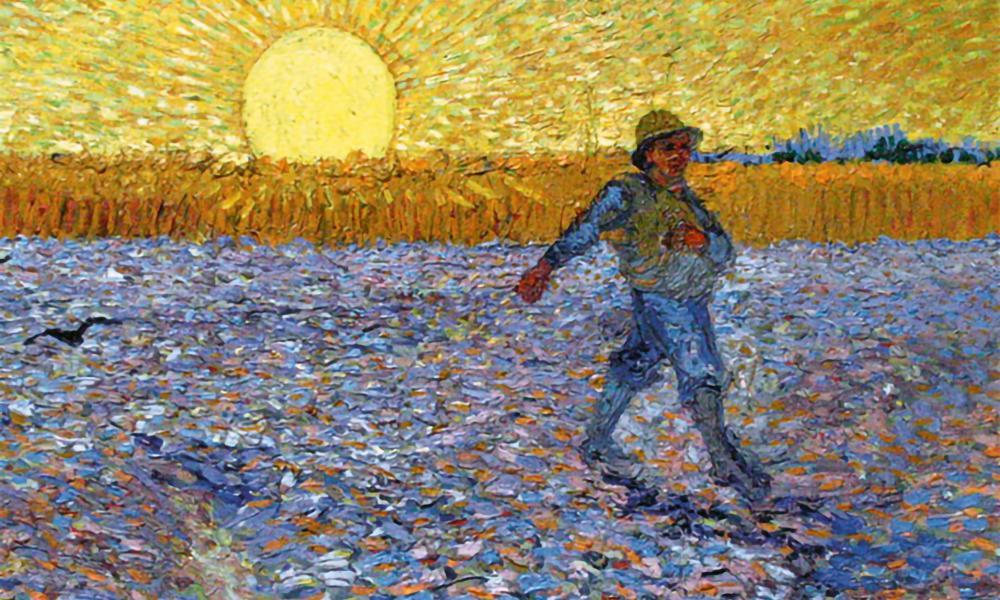
Lessons in Mercy: The Parable of the Sower
I give you a new commandment: Love one another. As I have loved you, so you also should love one another. This is how all will know that you are my disciples, if you ahve love for one another - Jn 13: 34-35
Throughout the Year of Mercy, we have been encouraged to “Be merciful, just as your Father is merciful.” (Lk 6:36) We also have been given clear instructions of what this requires of us — both individually and collectively. We are to feed the hungry, give drink to the thirsty, clothe the naked, shelter the homeless, visit the sick and imprisoned, bury the dead, instruct the ignorant, counsel the doubtful, admonish sinners, bear wrongs patiently, forgive offenses willingly, comfort the afflicted and pray for the living and the dead.
These corporal and spiritual works of mercy constitute the practical way we live out our call to be merciful. They are, in fact, the fruit by which we will be known. They are the expression of our love for each other and the defining characteristic of discipleship. They are how we put power to use in the service of life.
Of course, we cannot perform the works of mercy on our own, though we must will to do so. By their very nature, the works of mercy require divine grace. This grace is the supernatural love of God working through us. So as we bring to a close our year-long reflection on mercy, let us explore a few of the obstacles that can prevent the supernatural love of God from working through us. Some obstacles can inhibit our being merciful and thereby derail our life of discipleship – in short, some can cause us to bear rotten fruit.
Paths, rocks and thorns
In the parable of the sower, Jesus describes how a sower went out to sow seed. Some of the seed fell on a path where birds quickly came to consume it. Some fell on ground that was rocky. Because the soil was not deep there, the seed grew quickly but it just as quickly withered in the sun, as it lacked adequate roots. Still other seed fell among thorns and was choked. In all three cases, the seed produced no fruit.
Jesus later explains the meaning of this parable to his disciples. In doing so, he identifies for us three different ways we prevent God’s merciful love from operating through us.
First, the seed that fell on the path represents the person who hears the “word of the kingdom,” but does not truly understand it. This makes it easy for the devil to steal away what was sown. For example, we might read the passage about knowing the tree by its fruit and not realize that it means we are the tree that will be known by our fruits. This makes us vulnerable to a spiritual inflation or pride whereby we believe we now have the criteria by which to judge any tree by its fruit. In such instances, we can easily fall into the trap of judging others, rather than being merciful to others.
The seed that fell on the rocky ground represents the person who hears the word and receives it with great enthusiasm and zeal. However, because the person has no roots, as soon as some tribulation or persecution comes the person’s way due to the word, she or he immediately abandons it. Here we are confronted with the type of Christianity that seeks comfort, power and pleasure free of any demands. When we succumb to this temptation, we are transformed into consumers of religion who judge the value of the faith and our affiliation with it on what the religion can do for us. In other words, it becomes evident that the supernatural love of God that requires us to act (for agape, divine love, is pure action) has not taken root in our life because the “soil” of our heart is too shallow. Consequently, our life demonstrates that, in reality, we know nothing of the love that requires us to die to the self; love that is other-centered by its very nature — that is self-giving, self-sacrificing and merciful.
Finally, the seed that fell among the thorns represents the person who hears the word, but has it choked by worldly anxiety and the lure of riches. Anxiety causes worry. Worry can cause us to focus completely on our own need and lack. When this happens, the needs of the neighbor recede into the background. Worry can also undermine our trust in and dependence on God. This prevents God’s love, in the person of the Holy Spirit, from blowing where it will for the Spirit does not impose itself against our will.
In a similar way, the lure of riches directs our desire from the Creator to the created. When we put our faith in the power and life that wealth offers us, we fall victim to an illusion. This is another form of that disordered self-centeredness that cuts us off from the love of God and neighbor where true self-love, and our very life, alone reside.
Final thoughts
The official Year of Mercy ended for the universal Church in November. However, the Church’s mission of mercy has no end. Let us pray that the call to “be merciful, just as your Father is merciful,” resounds throughout our lives and the life of the Church in all the years to come. Then, we can truly say we lived “Years of Mercy” and, through our fruits, we may be known as the “good trees.”
Spiritual Reading
“The essence of perfection is to embrace the will of God in all things, prosperous or adverse. In prosperity, even sinners find it easy to unite themselves to the divine will; but it takes saints to unite themselves to God's will when things go wrong and are painful to self-love.”



